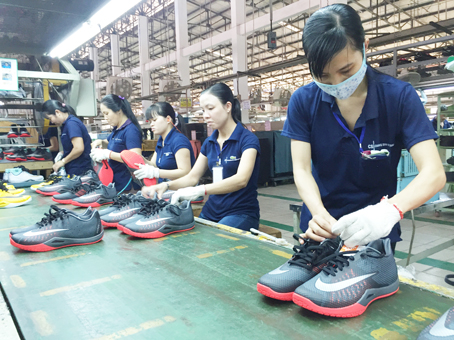
Footwear industry is forecasted to be affected heavily in the era of the 4th-generation industry. In the picture: Production of sport shoes for export in an enterprise in Dong Nai.
Generation 4.0 is a trend that combines the real world, the virtual world and the living world, all of which are connected to the internet (IoT), internet connection systems (IoS) and artificial intelligence (AI). Thanks to that, intelligent "activities" will lead to great changes in the future. The 4.0 generation industry anticipates tremendous impact on every rule, every economy, every industry, challenging the notion of the true role of the labor force.
4.0: The inevitable trend
In human development, this is an inevitable the trend. Anyone who has seen the history of the modern world recalls the last three industrial revolutions. In 1784, the emergence of steam engines leading to the mechanization which replaced human force was considered the first industrial revolution. Subsequently, during the period of 1871-1914 with the invention of electricity, electric motors and mass production lines brought the world into the electrolysis. By 1969, the birth of computers was a tremendous boost for humankind to enter the automation process. And now, the industrial revolution 4.0 brings the world to the digital era.
We can imagine that, 4.0 will digitally connect: people with people; people with things; things with things anytime, anywhere. Thanks to this technology, machines also have "intelligence", more specifically intelligent robots that can replace people at all levels, becoming a formidable competitive force. Many new intelligent materials that are capable of self-cleaning or self-recovery has come into being. Automated (self-driving) vehicles has also appeared. In the field of biotechnology, synthetic biology can create the ability to customize the body by adjusting the DNA ... What has appeared in previous science fiction films can all be in existence in the field of biotechnology in the future.
With unprecedented changes in scale and speed in human history, technology 4.0 predicts a strong and comprehensive impact on the world, generally speaking, it is like "drawing" the world economic map. Countries, corporations, and businesses that are strong in digital technology will become the new "great nations", and vice versa will be eliminated if they fail to adapt to the change.
Learn how to adapt
However, every coin has two sides. Industry 4.0 is not a magic wand to bring heaven to everyone. In addition to the benefits that 4.0 brings, there are more vulnerable groups that are exposed to even greater risks.
More specifically, the emergence of robots will cause some groups to lose their jobs. In particular, simple, unskilled, old-technology based labor and old labor groups will be affected significantly. The number of unemployed people has increased, leading to the widened gap between rich and poor and increase in inequality. Prof. Klaus Schwab, president of the World Economic Forum cited an estimate of about 47 percent of current US jobs may disappear owing to automation in his book entitled The fourth Industrial Revolution.
Those countries that compete in the market based on cheap labor, including Vietnam, will be negatively impacted, leading to social instability. Historically, industrial revolutions have experienced an increase in injustice that resulted in a series of major political and economic shifts. Previously in the era of mechanization, that machines replaced human workers who became unemployed and smashed machines; then that the Great Depression of 1929-1933 took place because of too much production compared to the demand in the market ... are all notable lessons.
In addition, the connection in the "super-flat world" of 4.0 also leads to the concern about the loss of national and cultural identity of many countries, many cultures. People with communication in the 4.0 era face the risk of losing the need for direct communication. Recently, news on a Chinese engineer married to ... robots surprised many people, but it may be the near future in the 4.0 era when the robot is as perfect as a human, even superior because the robot does not ... speak or grumble, do not give commands and do not ask for your monthly salary (like what a typical wife would do).
There are many problems that people cannot imagine before the rapid development of 4.0 technology, such as how national security would be. But humans cannot reject the advancement of science. Therefore, the only way to this problem is to identify and face, learn to receive and adapt.
Compared to developing countries, Vietnam has lagged behind in the previous three industrial revolution, but still has to integrate into the world which is changing fast in the high-tech era. With 4.0, cheap labor in Vietnam is no longer an advantage. Vietnam's economy is thriving in the textile and footwear sector, creating jobs for many workers. According to Associate Prof. Dr. Tran Dinh Thien, labor in these two sectors accounts for 6.2% of total labor force and 13.7% of non-agricultural employment. However, with the 4.0 technology, the automation process will reduce labor and costs, so the two sectors will return to developed countries, resulting in the loss of advantage of low-wage laborers (in China, Vietnam, Cambodia, Bangladesh and Myanmar). It is predicted that 86% of garment and footwear workers in Vietnam are at high risk of unemployment; electronic industry in our country also suffer the same scene.
Recognizing the risk, Vietnam must move ahead and be determined to "board the 4.0 train" soon to create a competitive advantage and create a new status of the nation. In order to do so, there must be a source of "digital manpower" to adapt to 4.0 in the future. And to do so, it is necessary to have new policies on education and science and technology innovation soon; otherwise, the dark days are unavoidable.
Associate Prof. Dr. Huỳnh Văn Tới
